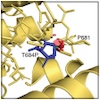 NFKB2 haploinsufficiency identified via screening for IFN-a2 autoantibodies in children and adolescents hospitalized with SARS-CoV-2–related complications
NFKB2 haploinsufficiency identified via screening for IFN-a2 autoantibodies in children and adolescents hospitalized with SARS-CoV-2–related complicationsAaron Bodansky, Sara E Vazquez, Janet Chou, Tanya Novak, Amer Al-Musa, Cameron Young, Margaret Newhams, Suden Kucukak, Laura D Zambrano, Anthea Mitchell, Chung-Yu Wang, Kristin Moffitt, Natasha B Halasa, Laura L Loftis, Stephanie P Schwartz, Tracie C Walker, Elizabeth H Mack, Julie C Fitzgerald, Shira J Gertz, Courtney M Rowan, Katherine Irby, Ronald C Sanders Jr, Michele Kong, Jennifer E Schuster, Mary A Staat, Matt S Zinter, Natalie Z Cvijanovich, Keiko M Tarquinio, Bria M Coates, Heidi R Flori, Mary K Dahmer, Hillary Crandall, Melissa L Cullimore, Emily R Levy, Brandon Chatani, Ryan Nofziger; Overcoming COVID-19 Network Study Group Investigators,; Raif S Geha, Joseph DeRisi, Angela P Campbell, Mark Anderson, Adrienne G Randolph
Journal of Allergy and Clinical Immunology, 2022Abstract: Background
Autoantibodies against type I IFNs occur in approximately 10% of adults with life-threatening coronavirus disease 2019 (COVID-19). The frequency of anti-IFN autoantibodies in children with severe sequelae of severe acute respiratory syndrome coronavirus 2 (SARS-CoV-2) infection is unknown.
Objective
We quantified anti–type I IFN autoantibodies in a multicenter cohort of children with severe COVID-19, multisystem inflammatory syndrome in children (MIS-C), and mild SARS-CoV-2 infections.
